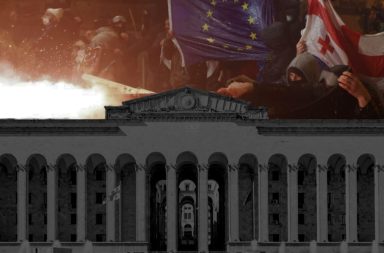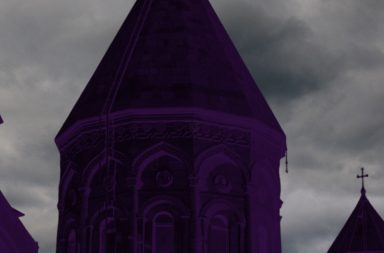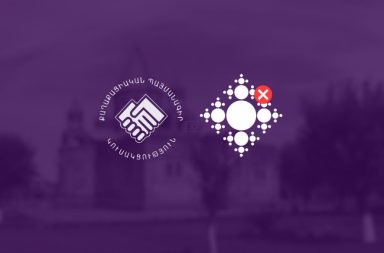by Kegham Balian
On a recent appearance on ILTV News Podcast, the Armenian Ambassador to Israel, Arman Akopian, accomplished what has become the norm for Armenian diplomats in 2025: he unburdened his conscience by handing it off entirely. With all the passivity of a man excusing a war crime as a scheduling inconvenience, he declared that Israeli weapons, used by Azerbaijan to disfigure Artsakh and pulverize 5,000 Armenian soldiers, most of them barely 18 – were part of a “sad page” that has now been “turned”.
Let us pause to appreciate the theatre of the grotesque. The systematic ethnic cleansing of Artsakh’s Armenian population, enabled by Israeli drones, cluster munitions, and silent applause, has not even faded from memory. In Ashtarak, a town about 20 minutes from Yerevan, I heard a harrowing account from the 44-Day War: three Armenian soldiers stationed at an outpost heard the ominous buzzing of a drone, followed by an explosion that killed one and buried another under rubble. The third, without regard for his own safety, ran to dig his friend out—his fingers torn and dangling from his hands by shrapnel-hot metal that sliced through flesh. An indubitable act of courage in the face of death. And yet, in our hut of diplomacy, where courage is needed in speech, not sacrifice, it is nowhere to be found.
Over 150,000 Armenians fled in the span of days; churches were defiled, graveyards bulldozed, and a 3,000-year-old Christian enclave annihilated in 4K on our phones and social feeds. The banality of evil, raised high on the shoulders of fleeting guilt, diluted by the next content—and the next—until it is reduced to a historical footnote.
It gets worse. When asked—almost with embarrassment from the host—about Israel’s ongoing refusal to recognize the Armenian Genocide, Akopian rushes to assure his host that it’s not a priority. That the Armenian state makes no such demands. That it’s really up to “each country” to decide what to do with the extermination of a people. In other words, we won’t pain you with the memory of our dead.
This is not diplomacy. It is submission with a polite smile.
Here is the question posed by the interviewer. The more you read it, the more you wonder how a soft-ball pitch could be so horrendously mishit:
“You mentioned how we both experienced genocides, the Jewish people and the Armenian people, but Israel has not formally recognized the Armenian Genocide, and that’s despite the United States finally recognizing it under the Biden Administration. What are Armenia’s thoughts on this and do you think there is anything that can be done to encourage Israel to take that move? Why have we not done it?”
This raises the ultimate question: What, exactly, is Armenia’s submissiveness protecting?
There is no military cooperation, as proven by Israel’s complicity in the ethnic cleansing of Artsakh.
The Ambassador may suggest possible cooperation in agriculture, healthcare, or IT but there is no substantial economic exchange. In 2024, Armenia imported approximately \$13.4 million from Israel and exported \$9.3 million—peanuts, in the context of national trade.
The interviewer then proceeds to ask, point-blank, the following:
“I do want to ask about the Armenian Quarter here in Jerusalem. You mentioned it’s one of the keeps of the Christian faith. Talk about how many Armenians live here in Israel, and I know there’s been some controversy on some of the lands and other things in the area, so maybe just brief us on that real fast.”
Not. A. Word.
For 600 days, the Armenian community of Jerusalem has been struggling against a land deal that, as the Armenian Patriarchate put it, “the greatest existential threat in the history of the Armenian presence in the Holy Land”; fending off aggressors with automatic weapons, attack dogs, fence cutters, pepper-sprays in what has now amounted to more than a dozen attacks on our beleaguered community; where Israel has turned a blind eye—if not a complicit nod—to the attempted theft of the Cows’ Garden, a vital cultural heritage under the custodianship of the Armenian Patriarchate for more than 500 years. An illegal lease brokered in the dark with, allegedly, a private settler-backed developer, blessed by nothing but intimidation, backroom signatures, and the systemic disempowerment of a native Christian community. And where is the Armenian Ambassador? Nowhere to be seen. Not even in rhetoric, and certainly not at the protests or during the attacks.
The Ambassador, but more broadly, the entire apparatus of the Armenian Foreign Ministry, have not just failed in their duty to protect Armenian interests — they have betrayed it. Mr. Akopian stands in the presence of a state that arms those who would erase Armenians from their land, that denies the very genocide it should understand best, and that threatens the Christian character of Jerusalem itself — and he offers no condemnation, no resistance, but reverence.
Courage — even political courage — which takes on a different form when exercised in service of one’s government and its directives abroad, is not rooted in personal preference, but in the responsibilities inherent to the office. It is a quality that always reveals itself in the face of risk and danger.
But I ask you, Mr. Ambassador:
What do we call the absence of courage when there is no risk and no danger?
This article was originally published in The Armenian Weekly


